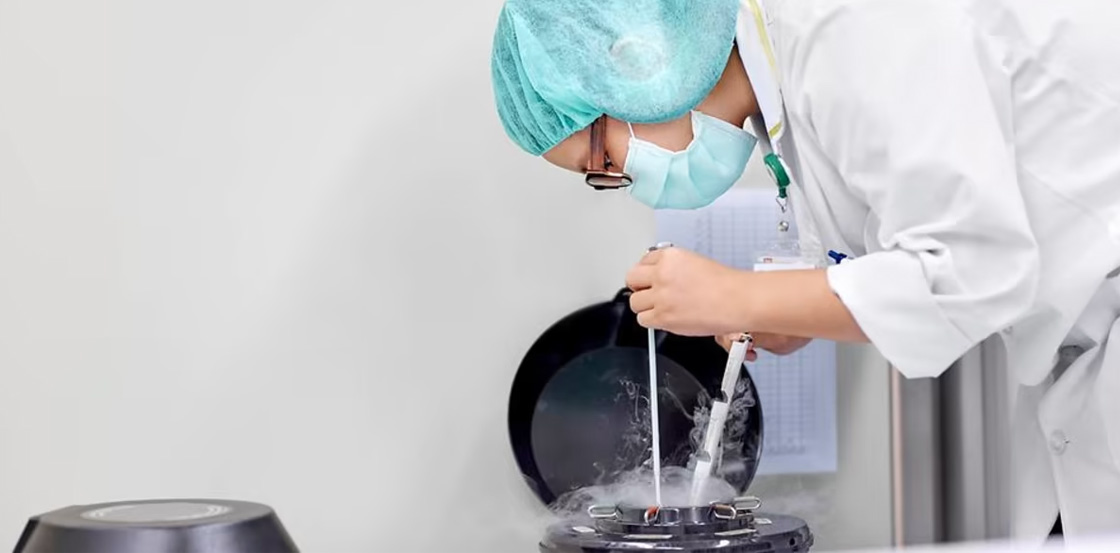Post link copied to clipboard!

If you’re not ready to start a family, you might be considering egg freezing in London. As women age, the quality and quantity of their eggs, their chances of getting pregnant naturally decline. This decline becomes more pronounced in the mid-thirties and even more so after the age of forty.
Although the rate of this decline varies from woman to woman due to factors like lifestyle, environment, and genetics, it’s a universal experience, and age is the primary factor behind declining fertility. So, higher-quality frozen eggs, collected when you’re younger, can provide a better chance of success when you decide to have a baby later in life.
If you’re curious about egg freezing in London, you likely have questions about potential risks and side effects associated with the procedure. You may be wondering: does egg freezing impact fertility? Let’s delve into this topic and provide you with answers
The freezing eggs process mirrors the initial stages of an in-vitro fertilisation (IVF) cycle. At Top Gynaecologists fertility clinic, you’ll undergo a thorough assessment to determine your suitability for egg freezing in London. Assuming you’re a suitable candidate, you’ll receive hormone medications to stimulate your ovaries to produce more eggs.
In a typical natural ovulation cycle, your ovaries release just one egg. However, fertility experts estimate that a woman under 35 years old with a healthy ovarian reserve has an 80-90% chance of a live birth if she preserves 20 frozen eggs. It increases the likelihood of having two or even three babies. The number of retrieval cycles needed varies; some women may require only one, while others may need more. To optimise your chances, you’ll receive medication to promote egg production and another to prevent premature ovulation. It is known as ‘controlled ovarian stimulation.
A reputable fertility clinic will closely monitor your progress with blood tests and scans, adjusting medication doses to ensure your ovaries respond well. After 10-12 days, you’ll receive a final ‘trigger’ injection to mature the eggs. Around 36 hours later, we’ll gather the eggs while the patient is under sedation. We’ll freeze and securely store only the fully matured eggs for any potential future fertility treatments.
Frozen eggs are gaining popularity as an ‘insurance policy’ for busy women who require more time – whether to find the right partner, advance in their careers, or build a stronger financial foundation before starting a family.
Many women contemplating egg freezing ask: Will freezing my eggs reduce my ovarian reserve? Does it affect my fertility?
The reassuring answer is: No, freezing eggs does not harm your fertility. Choosing frozen eggs won’t diminish your ovarian reserve or your chances of natural pregnancy.
To understand why, let’s look at the ovulation process. Each month during your menstrual cycle, only one egg typically survives the ovulatory process. While one egg follicle matures and gets released from the ovary, several other follicles become active but do not fully develop. Instead, they eventually die in a natural process called ‘atresia.’
There is no evidence to suggest an increase in chromosomal abnormalities, birth abnormalities, or developmental issues in children conceived using frozen eggs. Opting for higher-quality frozen eggs retrieved when you were younger can reduce the risks associated with older motherhood, such as miscarriages and genetic or chromosomal abnormalities.
In today’s landscape, a woman aged 40 or older stands a significantly better chance of experiencing a healthy pregnancy using frozen eggs harvested in her mid-30s than attempting to conceive with fresh eggs after reaching her 40s.
Every medical procedure has some potential side effects, and egg freezing is no exception. You might experience side effects from the hormone medication, such as tiredness, mood swings, and breast sensitivity, similar to premenstrual syndrome (PMS). There could also be soreness or redness at the injection site.
Following the egg retrieval procedure, some women might encounter slight vaginal discomfort. You can ease this discomfort using readily available pain relievers such as paracetamol. In most cases, women can return to work the day after the retrieval.
In rare instances, ovaries may become hyperstimulated due to hormone medications, known as ‘ovarian hyperstimulation syndrome.’ In such cases, bed rest or medical treatment may be necessary. However, reputable fertility clinics take extensive precautions by closely monitoring medication responses and ensuring the correct dosage to minimise this risk.